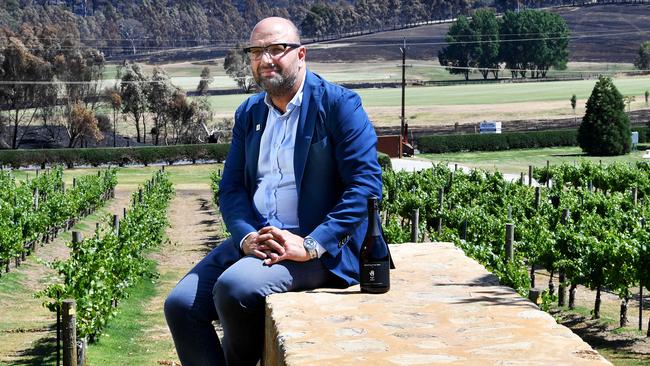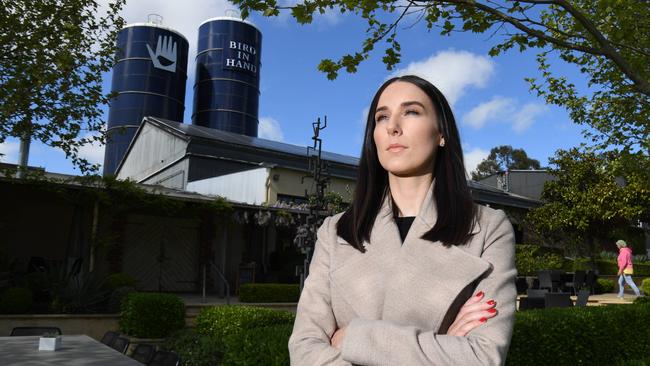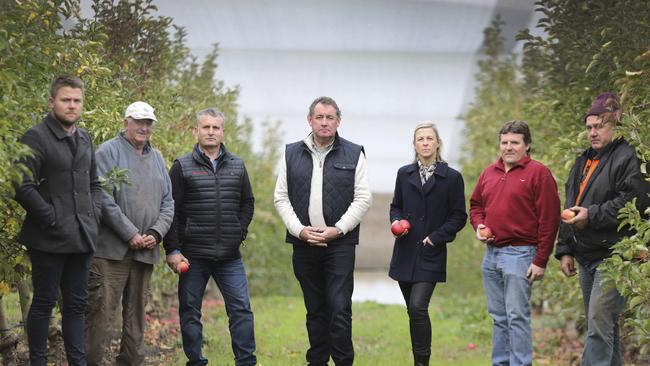The battle over the Bird in Hand gold mine stymied investment, and left a mining company furious
The battle over the now-blocked Bird in Hand gold mine is finished, ending an at-times acrimonious engagement. But what message did it send?

The importance of both mining and agriculture to the South Australian economy is well illustrated by the fact that both the Bird in Hand gold mine – whose development was this week blocked by the state government – and one of the neighbouring wineries opposed to its development, share the same name.
If you have a keen eye and know what to look for, it’s not hard to notice the historical signs of mining across the Adelaide Hills and more broadly throughout the state in areas such as Kapunda and the Yorke Peninsula’s Copper Triangle, which produced the revenues which kept the state solvent during its early days.
The Bird in Hand mine, at Woodside, was the largest of the gold mines operating in the Adelaide Hills in the late 19th century, before issues with water inflow closed it until the mid-1930s.
Technological advances made it once again feasible to look at reopening the mine in recent years, however the remaining gold deposit is arguably perfectly situated to create a land use conflict.
The Bird in Hand gold deposit, which mining company Terramin Australia planned to mine over a five-year period with the gold to be processed at Strathalbyn, is located between three premium wineries, with the world-renowned Bird in Hand winery, Artwine and Petaluma on its borders.

Terramin believed, and made the case over several years and via the production of extensive documentation and geological work, that its underground operations would not disturb the water table or adversely affect the operations of its neighbours or the amenity of the area.
The mine would also create 140 direct jobs and pump $50m a year into state coffers, Terramin said.
A coalition of local agricultural concerns, including wineries and food producers, disagreed with Terramin’s assertions, arguing the promised minimal impact on the water table could never be guaranteed, and raised concerns about truck movements and the reputational impact of having an operating mine next to wineries which traded on their “clean, green” image.
The mining project even drew the attention of global wine company Accolade, the owner of Petaluma, which in response to a call for submissions regarding the project said the proposed mine would pose an “unacceptable risk’’ to groundwater.
It also made the case, echoing concerns of many in the community, that generational businesses such as wineries were potentially being put at risk for a short term pay off from the mine.
“Any loss of access to ongoing supplies of water for irrigation has the potential for vineyard and winery operations to become non-viable,’' Accolade said in its submission.

“Even short periods of water unavailability can have significant impacts. In short, there is the potential to threaten the viability of vineyard assets with a 40 to 100-year life span in order to enable short term access (less than 10 years) to a gold deposit.’’
Terramin, for its part, said this week it is “surprised and disappointed” by the government’s decision, pointing out that it did exactly what the government asked it to do – producing a comprehensive mining plan, based on science, “which demonstrated that there would be no adverse environmental outcomes arising from (the) proposal’’.
Terramin said it answered all of the Department for Energy and Mining’s questions, provided all of the information and documentation sought, and believed it had satisfactorily responded to all concerns raised.
“To have been through this exhaustive process and then be denied the mining lease with no clear explanation of the grounds for this decision is most unexpected,’’ Terramin said.
The South Australian Chamber of Mines and Energy chief executive Rebecca Knol said the decision sends a red flag to other potential investors in the state, saying Terramin spent $16m over seven years on the approval process, only for it to come to naught.
“The Minister is sending a very clear message to investors – even if you have a world class deposit and invest millions to diligently meet the approval requirements, there is absolutely no assurance that you will receive a green light from this Government,’’ SACOME said.
Energy and Mining Minister Tom Koutsantonis, a long-time supporter of the mining sector, said this week he’d wrestled with the decision.
“This is not a decision I’ve taken lightly or easily,’’ he said.
But when it came to the crunch, the prospects of the local tourism and agricultural sectors won out over what was, in the end, going to be a short-term mining project.
“I am not willing to risk these established local industries against the opportunity this short-term mine may provide, and have decided it is in the state’s interest to decline the mining lease,’’ the Minister said.
And while Terramin may have ticked the box on the regulatory front, in the battle for the public’s hearts and minds it had some serious missteps.
While outwardly consulting with the community, behind the scenes Terramin’s lawyers Botten-Levinson – unbeknown to the company it said at the time – were going out of their way to make life difficult for family members of the Bird in Hand owners.
In emails read out in parliament three years ago by Kavel MP Dan Cregan, it was made clear that a member of the Hills community who was attending hospital with a sick child was served legal notices via email, relating to Terramin’s court bid to block a $30 million expansion at the Bird in Hand winery, despite not legally being a party to it.
Another partially redacted email chain read out by Mr Cregan showed Terramin’s lawyers contacting family members on purpose.
“I emailed it to (redacted) last night too. Largely just to piss the whole family off,’’ one email, sent by a lawyer reads.
Then there is the substance of that court case, which argued that Bird in Hand’s ongoing $30m expansion plans would affect the value of its own neighbouring property, and didn’t fit the “desired character’’ of the area.
The winery said the notion was both “laughable and hypocritical’’.
It is tactics such as these which led Inverbrackie Creek Catchment Group spokesman Jim Franklin-McEvoy to brand Terramin’s behaviour “intimidation’’.
Mr Franklin-McEvoy said this week he was pleased with the decision not to approve the mine and said it would now allow people to invest in their operations after years of uncertainty.
“We’ve had this hanging over our heads the whole time,’’ he said.
“The mine wouldn’t have been adding anything because you would have been risking the jobs and businesses that are already here.’’
Mr Franklin-McEvoy said tourism operators, who had suffered throughout the pandemic, had been particularly concerned about the impact of an operating mine in the area.
Now, after a 14 year battle against the mining project, he said there was a sense of relief in the community, and a desire to move on.


To join the conversation, please log in. Don't have an account? Register
Join the conversation, you are commenting as Logout